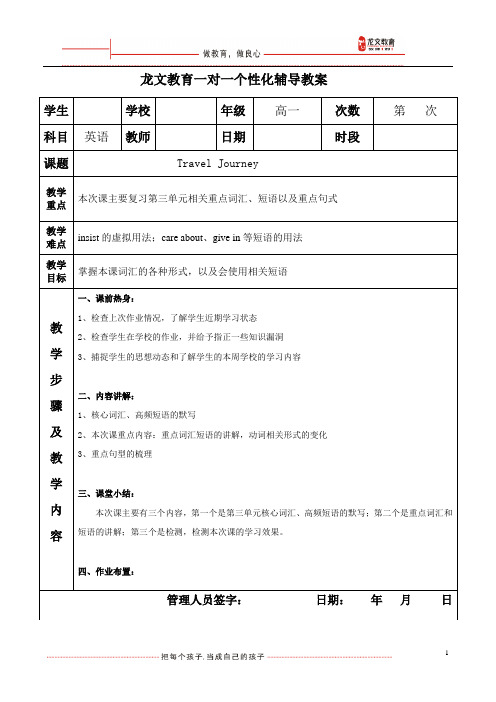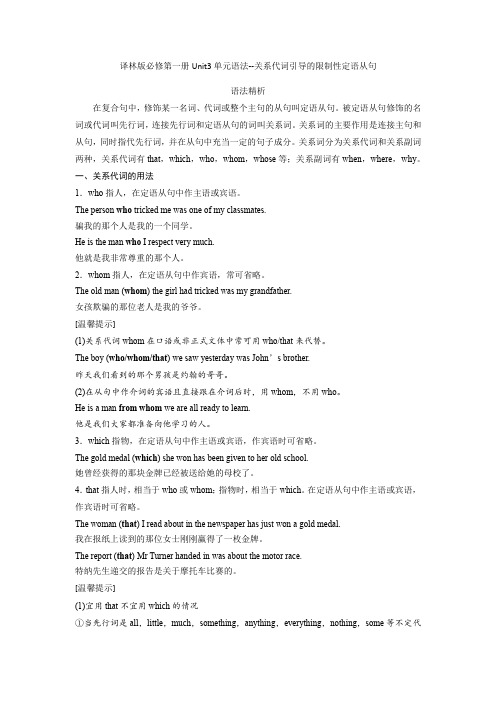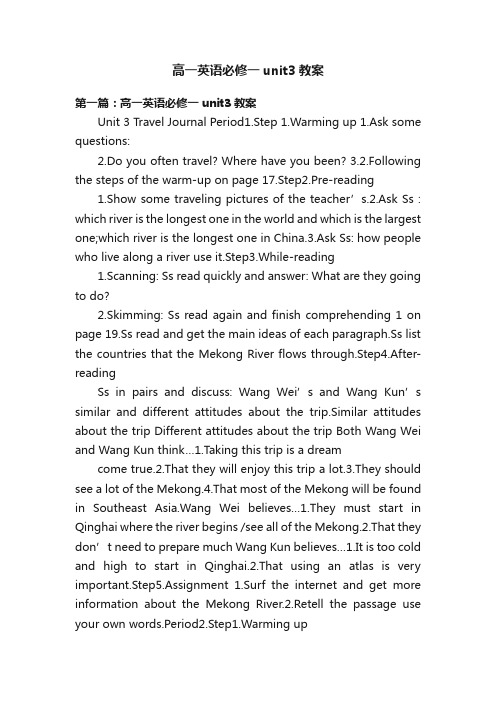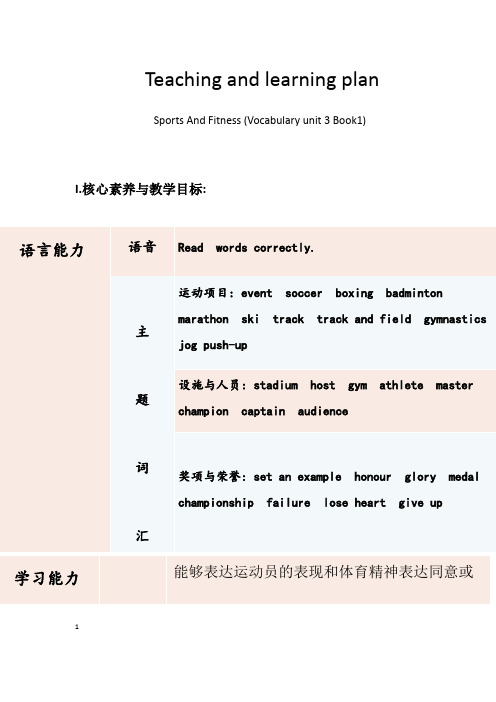高一英语必修一Unit3单词讲义教案.doc
必修一第三单元讲义

龙文教育一对一个性化辅导教案学生学校年级高一次数第次科目英语教师日期时段课题 Travel Journey教学重点本次课主要复习第三单元相关重点词汇、短语以及重点句式教学难点insist的虚拟用法;care about、give in等短语的用法教学目标掌握本课词汇的各种形式,以及会使用相关短语教学步骤及教学内容一、课前热身:1、检查上次作业情况,了解学生近期学习状态2、检查学生在学校的作业,并给予指正一些知识漏洞3、捕捉学生的思想动态和了解学生的本周学校的学习内容二、内容讲解:1、核心词汇、高频短语的默写2、本次课重点内容:重点词汇短语的讲解,动词相关形式的变化3、重点句型的梳理三、课堂小结:本次课主要有三个内容,第一个是第三单元核心词汇、高频短语的默写;第二个是重点词汇和短语的讲解;第三个是检测,检测本次课的学习效果。
四、作业布置:管理人员签字:日期:年月日作业布置1、学生上次作业评价:○好○较好○一般○差备注:2、本次课后作业:课堂小结家长签字:日期:年月日学生学校年级高一次数第次科目英语教师日期时段课题Unit 3 Travel Journal本单元掌握的重点单词:1.journal→journalist2.transport→transportation 3.prefer→preferable→preference 4.disadvantage→advantage 5.persuade→persuasion→persuasive6.graduate→graduation 7.finally 8.schedule 9.stubborn10.organize→organized→organization 11.d etermine→determined→determination 12.journey 13.bend 14.attitude 15.forecast 16.reliable 17.view 18.beneath 本单元掌握的重点短语:1.ever since 2.be fond of 3.care about 4.change one’s mind 5.make up one’s mind 6.give in(to) 7.as usual 8.at midnight 9.dream about doing 10.graduate from 11.at an altitude of 12.put up a tent 13.for one thing,...for another14.can’t/can hardly wait to do sth.本单元掌握的重点句型1.Ever since middle school, my sister Wang Wei and I have dreamed about taking a great biketrip.2.It was my sister who first had the idea to cycle along the entire Mekong River from where it begins to where it ends.3.When I told her the air would be hard to breathe and it would be very cold, she said it would be an interesting experience.4.Once she has made up her mind, nothing can change it.5.A determined person always tries to finish the job, no matter how hard it is.第一步:单元自测核心词汇1.He lets his daughter____________(挑选)her own birthday present in the shop.2.On arriving at the hotel,I approached the r____________desk to check in.3.He proved himself innocent by providing a lot of e____________.4. Three children were r____________from the school for their bad behavior.5.It was a terrible accident.Very few passengers____________(幸存)it.6.The two of them have____________(装饰)their new house romantically to celebrate their new life together.7.The gloves were____________(设计)for extremely cold climates.8.Our boss____________(爆发)with anger when he saw the sales report.9.The island is deserted,and the chance of____________of the five____________of the shipwreck is slim.(survive)10.It was____________that all the____________we collected proved him to be guilty.(evident) 11.All of us were____________at his really____________talent for music.(amaze)12.用worth的适当形式填空(1)Without thinking carefully about spending my money,I bought many____________things.(2)Although we take an hour a day for exercise,it is well____________it.高频短语1.________________寻找2.________________ 属于3.________________ 作为报答;回报4.________________ 处于交战状态5.________________ 少于6.________________ 拆开7.________________ 看重;器重8.________________ 调查9.________________ 把某物从……搬到……10.________________ 而不是;与其第二步:语言点核心单词1.insist v. 坚持,强调搭配insist on (sb’s) doi ng sth. 坚持要(某人)做某事insist that-clause… (should)do sth. 坚持要求做某事insist that-clause…(正常时态)坚持认为练习请根据中文提示完成以下句子。
人教新课标高中英语必修1Unit3词汇学习教案(精选5篇)

人教新课标高中英语必修1Unit3词汇学习教案(精选5篇)第一篇:人教新课标高中英语必修1Unit3词汇学习教案Section 3 Words and expressions from Unit 3 Travel journal Transportn.运输、运输工具;(常用复数)强烈的情绪、狂喜或狂怒v.运输;流放;为强烈的情绪所激动1.The transport of goods by air is very expensive.空运货物费用十分昂贵。
2.Wheat is transported from the farms to the mills.把小麦从农场运到面粉厂。
3.My car is being repaired so I'm without transport at the moment.我的汽车正在修理, 所以我现在没有代步工具了。
4.I normally travel by public transport.我出门通常乘坐公共交通工具。
5.The role of the railways declined in the transport system.在运输系统中,铁路的重要性逐渐下降。
6.Please find alternative means of transport.请另外找一个运输方法。
7.London Transport run extra trains during the rush-hour.伦敦运输公司在交通高峰时间增开加班列车。
8.The goods have been cased up for transport.货物已装箱待运。
cyclen.循环,周期 v.骑自行车1.This is the cycle of economic booms and slumps.这是经济繁荣和经济萧条的周期变化。
2.He goes to work by cycle.他骑自行车上班。
Unit 3 Grammar 讲义-高一英语牛津译林版(2020)必修第一册

译林版必修第一册Unit3单元语法--关系代词引导的限制性定语从句语法精析在复合句中,修饰某一名词、代词或整个主句的从句叫定语从句。
被定语从句修饰的名词或代词叫先行词,连接先行词和定语从句的词叫关系词。
关系词的主要作用是连接主句和从句,同时指代先行词,并在从句中充当一定的句子成分。
关系词分为关系代词和关系副词两种,关系代词有that,which,who,whom,whose等;关系副词有when,where,why。
一、关系代词的用法1.who指人,在定语从句中作主语或宾语。
The person who tricked me was one of my classmates.骗我的那个人是我的一个同学。
He is the man who I respect very much.他就是我非常尊重的那个人。
2.whom指人,在定语从句中作宾语,常可省略。
The old man (whom) the girl had tricked was my grandfather.女孩欺骗的那位老人是我的爷爷。
[温馨提示](1)关系代词whom在口语或非正式文体中常可用who/that来代替。
The boy (who/whom/that) we saw yesterday was John’s brother.昨天我们看到的那个男孩是约翰的哥哥。
(2)在从句中作介词的宾语且直接跟在介词后时,用whom,不用who。
He is a man from whom we are all ready to learn.他是我们大家都准备向他学习的人。
3.which指物,在定语从句中作主语或宾语,作宾语时可省略。
The gold medal (which) she won has been given to her old school.她曾经获得的那块金牌已经被送给她的母校了。
4.that指人时,相当于who或whom;指物时,相当于which。
高一英语人教新课标必修1Unit3教案

I. Warming up Step1. lead-in by discussing Talk about experence of journey. 1. Where have you ever been before/ in the National Day? 2. How do you like the travel to …? (eg: I have been Beijing during holiday. It is very interesting that … We visit … and found … That journey helps me know the culture there better.) 3. Why do you think the journey is helpful? To To ……(to brunden our horizons; to learn more about local culture and history; to relax; to make friends; to get a better understanding of of……) Step2. Warming up Task1. Part 1 on Page17 1. If you want to go travelling, where are you going? How did you get there? (on foot; by bike; by bus; by car/jeep; by train; by plane/by air; by boat/by ship/by sea )2. If you are given a chance to travel around the world, what kind of transportations will you use and why? (What do you have to consider before you decide which means of transport you will use? Cost(花费)/ Safety(安全安全)/ Comfort (舒适)/ Quickness/ Convenience (方便)) 3. Now look at the following chart on Studentbook and discuss it in your group. (Discussion Making note Grouping sentencesSpeech ) Task2. Part 2 on Page 17 Make dialogues A: When are you leaving? B: I am leaving …Sample dialogue A: Tom, where are you going on holiday? B: I ’m going to Laos. A: When are you leaving? B: I am leaving next Sunday. A: How are you going to Laos? B: I ’m taking a plane. A: How long are you staying in Laos? B: I am staying there about two weeks. A: Great. Have a good trip. B: Thanks. Step3. Homework 1. Make a speech (workbook) 2.导学大课堂P67-68/课前导读课前导读II. Reading(1) Step1. RevisionMake a speech on Page55 Workbook Step2. Lead-in Do you like traveling along a river, a great river? What role does a river play in people’s life? In other words, how do people who live along a river use it? 1. Where are you going on holiday? 2. When are you leaving? 3. How are you going to…?4. When are you arriving in/at…?5. Where are you staying? 6. How long are you staying there? 7. When are you coming back?The suggested answers:People can drink the water in a river or wash their clothes. People can swim in a river in summer. People can use a river to irrigate their fields. People can use a river to produce electricity. People can travel along a river. of/abouta…dreamthat…sb.1) He dreams of working for himself and not having a boss one day.= sb.sb.sb.sb.sb. persuade persuade5) 我想把这些椅子弄到楼上去.I want to get these chairs ________. 6. stubborn1) He is too stubborn to apologize. 2) You’ll have to push hard, that door is a bit stubborn.3) The old man has got a stubborn cough that has lasted for weeks. (as) stubborn as a mule 7. Although she didn’t know the best way of getting get to p laces, she insisted that she organize the trip properly. 尽管她不知道旅行的最佳方式, 但是她还是坚决主张她来合理安排这次旅行。
高一英语必修一unit3教案

高一英语必修一unit3教案第一篇:高一英语必修一unit3教案Unit 3 Travel Journal Period1.Step 1.Warming up 1.Ask some questions:2.Do you often travel? Where have you been?3.2.Following the steps of the warm-up on page 17.Step2.Pre-reading1.Show some traveling pictures of the teacher’s.2.Ask Ss : which river is the longest one in the world and which is the largest one;which river is the longest one in China.3.Ask Ss: how people who live along a river use it.Step3.While-reading1.Scanning: Ss read quickly and answer: What are they going to do?2.Skimming: Ss read again and finish comprehending 1 on page 19.Ss read and get the main ideas of each paragraph.Ss list the countries that the Mekong River flows through.Step4.After-readingSs in pairs and discuss: Wang Wei’s and Wang Kun’s similar and different attitudes about the trip.Similar attitudes about the trip Different attitudes about the trip Both Wang Wei and Wang Kun think…1.Taking this trip is a dreamcome true.2.That they will enjoy this trip a lot.3.They should see a lot of the Mekong.4.That most of the Mekong will be found in Southeast Asia.Wang Wei believes…1.They must start in Qinghai where the river begins /see all of the Mekong.2.That they don’t need to prepare much Wang Kun believes…1.It is too cold and high to start in Qinghai.2.That using an atlas is very important.Step5.Assignment 1.Surf the internet and get more information about the Mekong River.2.Retell the passage use your own words.Period2.Step1.Warming upAsk some Ss to retell the passage that they have learnt last period.Step2.Learning about the languageTeacher explains some language points in the text on page 18.1.Persuade sb.into /out of sth.: cause sb.(not)to do sth.by arguing or reasoning with him 说服或劝说某人(不)做某事He is easily persuaded.Wang Kun couldn’t persuade his sister to change her mind.persuade sb.(that clause): cause sb.to believe sth.;convince sb.使某人信服How can I persuade you that I am telling the truth?2.insist(v.): demand(sth)forcefully, not accepting a refusal 坚持或坚决要求;eg.Since he insisted, I had to stay.insist on sth/doing sth: require or demand;refuse to accept an alternative 一定要(某事物),坚决主张She insists on getting up early and playing her radio loud.3.care about: be worried, concerned or interested 忧虑,关心,惦念don’t you care about anybody? I don’t care about what happens to him.care for /to do: be willing or agree to do sth.;wish or like to do sth.Would you care a drink? Would you care to go for a walk? care for sb.1).Like or love sb.He cares for her deeply.2).Look after sb;take care of sb;be responsible for sb Who will care for your child if you are out?4.Once she has made up her mind, nothing can change it.她一旦下了决心,什么也不能使她改变。
人教版高中英语必修一Unit 3 Sports And Fitness单词教学案

1Teaching and learning planSports And Fitness (Vocabulary unit 3 Book1)I.核心素养与教学目标: 学习能力能够表达运动员的表现和体育精神表达同意或语言能力语音 Read words correctly.主题词汇 运动项目: event soccer boxing badminton marathon ski track track and field gymnastics jog push-up 设施与人员: stadium host gym athlete master champion captain audience奖项与荣誉: set an example honour glory medal championship failure lose heart give up2II. Teaching Important and Difficult Points:Practising words in order to use words to communicateIII. Teachong methods:Situational teaching(听说法);Task based teaching method (任务型教学法); The communicacative approach(交际法)Team competition(团队竞赛)IV. Teaching StepsStep1.Listening ,reading and correcting the students’ pronunciations Step2.Checking wordsStep3.Translation competition (翻译竞赛)Step4 Word formation (词形派生)Skills in learning words (师生归纳)1.-ness,名词后缀,表示“性质,状态,程度“.例如:goodness, kindness, tiredness,friendness, illlness fitness2.--er/or )名词后缀,表示“的人,的物””例如:3computer, washer, editor,visitor,error master3.—ing名词后缀, 表示物品和物质名称的含义。
高中英语必修一unit3+(3课时)+教案.doc
江南中学英语学科教学设计知识与能力words:journal fare transport Vietnam finally cycle persuade stubborn insist proper properly determine determined altitude valley attitude shorts camp record topic familiar brave phrases:one-way fare dream of/about persuade somebody to do something be determined to do something as usual change one’s mindthe third person referring to the chart.Step 7 HomeworkFinish the workbook exercises. 巧和方法,使学生提高阅读的准确性和有效性。
通过小组活动和总结,发挥学生的主动性,将课堂还给学生。
当堂检测有效练习Exercises on ppt作业布置Finish the exercises on XINXINXUEAN板书设计Unit 3 Travel JournalThe Mekong River The structure of the textChina, DreamLaos,Thailand, Different attitudeCambodia,Vietnam. Preparations教学反思本课为湄公河旅行日记的第一部分“Patt The dream and精美句子1、善思则能“从无字句处读书”。
读沙漠,读出了它坦荡豪放的胸怀;读太阳,读出了它普照万物的无私;读春雨,读出了它润物无声的柔情。
读大海,读出了它气势磅礴的豪情。
读石灰,读出了它粉身碎骨不变色的清白。
2、幸福幸福是“临行密密缝,意恐迟迟归”的牵挂;幸福是“春种一粒粟,秋收千颗子”的收获. 幸福是“采菊东篱下,悠然见南山”的闲适;幸福是“奇闻共欣赏,疑义相与析”的愉悦。
英语必修一unit3教案
英语必修一unit3教案【篇一:新人教版高一英语必修1unit3 travel journal 全单元教案】unit 3 travel journali.teaching aims and demands:1.skill goals:describe a journey.revise means of transportation.the present progressive tense expresses futurity.keep a travel journal to show personal impressions.2.function sentence patterns---good wishes and farewellshave a nice/ good time. have a nice/good time.tare care.good luck on your journey.say “ hello” to …write to me.give my love / best wishes to … have fun.3.vocabulary:journal, fare, transport, finally, cycle, persuade, stubborn, insist, proper(ly), determine(d), altitude, valley, attitude, shorts, camp, record, topic, familiar, brave, give in, change one’s mind. detail, atlas, glacier, rapids, waterfall, plain, delta, canyon, afterthought.vientiane, laos, phnom penh, cambodia, ho chi minh, vietnam, mekong, tibetan.4.grammar:the present continuous tense to express future actions.ii.the analysis of the teaching material:1. warming-up and listening: let students know that travel is very common inmodern society. ask them to discuss the fares to get to one place for different kinds of transport. do some listening practice2. pre-reading and reading: the word has many great rivers. one of them is themekong. introduce a travel journal---journey down the mekong to students.3.learning about language: in this part, students will discover useful words and expressions and also learn useful structures---- the present continuous tense to express future actionsing language: present how to write a travel journal and then practise writing iii.teaching arrangment1stperiod 2nd period 3rd period 4thperiodwarming-up and listening reading learn about languageusing languagethe first period warming-up and listeningteaching aims1. to talk about things related to travel, e.g. the place the fares and transport, etc.2. to improve the ss’ listening ability.teaching important points1. to talk about travel.2. to tell the ss how to catch the key points when they do listening.emotion goals:there are so many beautiful places in china and the whole world. we should love our country, love the whole world and love nature.teaching aidsa tape recorder, a projector and a computerstep 1. a song (歌词见后面)step 2 warming upshow the photos of some beautiful places on the powerpoint. (the great wall; yuanming yuan ; budala palace; venice; the liberty statue in new york,america; fujiyama.)ask students whether they know where they are.then t ask: do you like traveling? ss: yest: why do you like traveling? (超级链接):enjoy beautiful scenery; increase our knowledge; make friends; be good to health…ss may have a lot of different ideas. give them time to talk freely.t ask: how will you prepare for traveling? (including the time, the place, the means, the cost, the things you’ll take along, … of traveling) (超级链接) :1. time (超级链接):the spring festival; national day; may day; weekend; summer( winter) vacation…2.destination(超级链接): enjoy some beautiful pictures of famous places with the whole class: huangshan黄山; jiuzhaigou九寨沟; guilin桂林; stone forest(石林); jiuquxi(九曲溪; yunufeng,wuyi(武夷玉女峰); sanqing mountain三清山; hangzhou;longmen caves (龙门石窟);tian’anmen square(天安门广场);terracotta,xi’an(西安兵马俑); summer palace(颐和园); london bridge;the opera house悉尼歌剧院; eiffel tower艾菲尔铁塔.3.what to do(超级链接): rock climbing; rafting; bengee; skiing; hikingallow the ss to talk more about it.4.travel cost: talk with the ss quickly.5.things to take(超级链接): id cards(身份证) passports; money (cash); a book of maps; 等。
新人教版高一英语必修一Unit 3 Sports and fitness
Unit 3 Sports and Fitness All sports for all people.-----Pierre de Coubertin本教案特别适合高中教师和学生的提前备课和预习。
今天的话题是运动和健康。
主要包括:体育健身活动,体育人物,正确的健身等MATEBOOK 132020/9/28Unit 3 Sports and Fitness第一部分;必备词汇和短语(key words and phrases):Key words:1.soccer n. 足球2.stadium n.体育场3.boxing n. 拳击4.badminton n.羽毛球5.marathon n.马拉松6.event n. 比赛项目7.ski n. 滑雪8.track n.跑道,田径9.athlete n.运动员10.master n.高手11.honor n.荣誉,荣幸12.medal n.奖章,勋章13.captain n.船长14.graceful adj.优美的,优雅的15.sweat n./v 汗水,出汗16.audience n.观众,听众词汇拓展:1.fitness n. 健康,适合------fit adj.健康的,合适的2.host vt. 办,主办n 主人--------hostess n.女主持人3.gym n.健身房,体育馆----gymnastics n.体操训练4.champion n.冠军,优胜者-----championship n. 锦标赛,冠军赛5.injure vt.使受伤-----injured adj.受伤的------injury n.伤害,损伤6.strength n.力量,体力-----strengthen vt. 加强,增强7.Determination n.决心,决定------determined adj.下决心的-----determine vi.决定8.Failure n.失败-------fail vi 失败-----(反)-succeed vi 成功------success n.成功pete vi. 竞争,对抗-------competition n. 比赛;竞争------competitor n.竞争者lion n.一百万------millionaire n.百万富翁Phrases:e along;跟随,到达,进步2.Work out 锻炼,计算出3.Make it 获得成功,准时到达4.Lose weight 减肥5.Be up to sb. 有某人来决定6.Set an example 树立榜样7.Fall apart 破裂,破碎8.Lose heart 失去信心9.Give up 放弃10.Make sense 讲得通,有道理11.Pretend to do sth. 假装做某事12.Even if / though 即使,尽管第二部分:听力素养(listening skills ):运动和健康的词汇和句型积累:词汇:1.run an exciting marathon2.an e-sports evente along4.in the new stadium5.fill with6.on the final lap7.do your best to win8.make no sensepete for one’s country10.make it句型:1.would you like to go to the soccer game?你想去看足球吗?2.why not run an exciting marathon?为什么不去跑一场刺激的马拉松呢?3.how about watching badminton this afternoon?今天下午看羽毛球必扫怎么样?4.Did you hear that there’s an e-sports event this weekend?周末有一场电子竞技赛,你知道吗?5.Why don’t you join us this Saturday afternoon?为什么这个周六下午你不跟我们一起玩?6.It’s more important to help each other than to win.互相帮助比赢跟重要。
新人教版高一英语必修一第一册 Unit 3 教案
引导学生得体地使用附加疑问句及恰当的语调,开展小对话。
难点
让学生关注语言表达的得体性。提高学生运用语法项目的准确性,体会在真实场景中运用附加疑问句的意义。
教学方法
Self-learning approach; asking-and-answering activity.
教
学
内
容
与
过
程
Step1 Leading-in
When is your birthday?
What do you have for breakfast?
What is your favourite sport?
What sports events have you been to?
Can you ski?
3. Ask students to add a few more questions.
4. As a warm-up activity, have students ask each other the questions in pairs,
swapping pairs a few times.
5. Model the activity with a student first.Tell students not to write down any of the answers, and continue with your class on tag questions.
1. So the other girl won, did she?(根据语境,可以表示兴趣)
2. Oh, you’ve made another mistake, have you?(根据语境,可以表示愤怒)
- 1、下载文档前请自行甄别文档内容的完整性,平台不提供额外的编辑、内容补充、找答案等附加服务。
- 2、"仅部分预览"的文档,不可在线预览部分如存在完整性等问题,可反馈申请退款(可完整预览的文档不适用该条件!)。
- 3、如文档侵犯您的权益,请联系客服反馈,我们会尽快为您处理(人工客服工作时间:9:00-18:30)。
Book 1 Unit31.prefer vt 更喜欢,选择某物(而不选其他)①prefer A/doing to B/doing 更喜欢A…比起B②prefer to do rather than do 宁愿干…而不愿意干③prefer sb to do sth宁愿让某人干某事④preference n 偏爱,最喜欢的东西I much 猫和狗之间我更喜欢狗。
他更喜欢读书胜过玩。
He prefers reading .= He prefers to2.fare(公共汽车,火车,出租车等的)车费,(飞机等的)票价①a bus/taxi fare 公共汽车费、出租车费② an air fare 飞机票价③ travel at half/full fare 半价、全价旅行辨析fare 与feefare 指乘坐公共汽车、轮船、出租车等的交通工具费用。
fee 常用复数fees,指①给律师、医生等的专业人员的服务费、酬金②报名费entry fee③(加入俱乐部)会费entrance feeIf you want to join, there is of $20入会需缴会费20美元。
3.reliable adj.可信赖的,可靠的①rely vi 依靠,依赖②rely on sb/sth 依靠某人/某物③rely on sb to do sth依靠某人做某事You can you.你尽管信赖我,我一定会帮你。
4.view ①[c]观点,看法②[c]风景,景色③[u]视野④vt 观看;看待拓展①in one’s view=in one’s opinion 据某人看来②in view of鉴于,考虑到,由于③in view 可以看到,在看得见的范围内反义词看不见,不在视野之内④come into view 进入视野⑤view作“景色”解时指从某一特定角度所看到的景色,尤指从高处或远处。
have/get a good view of,she is a fool.依我看,他是一个傻瓜There was no shelter .举目四望,看不到可以栖身的地方。
This hotel has a very good location. You can have a good from here.5.ever since 从那以后(至今),常与现在完成时态连用。
since 可作介词、连词或副词,所以其后可加时间名词、从句或单独使用。
常与现在完成时态连用I want to see how much he has changed .我想看看自从上次看见他后,他的变化有多大。
She left school three years ago and as a nurse .She as a nurse three years ago.She as a nurse she school three years ago.她三年前毕业,从那时起便一直当护士。
拓展It is / has been +时间段+since从句,若从句谓语为瞬间动词,意为“自从…至今已经多久了”。
若从句谓语为持续性动词,意为“自不…至今已经多久了”。
It’s five years since I started the project.It’s five years since I worked in the factory.6.beneath prep ①表示位置、场所,“在…之下”②表示等级、职位等“低于、与…不相称”;不值得adv在…下面;朝下Joe enjoyed feeling the warm sand Joe 喜欢脚踏温暖沙子的感觉。
Such behaviour is .这种行为与你的身份不符。
We looked down from the plane at the large fields beneath.7.schedule①n.时间表,进度表。
常见搭配:ahead of schedule 提前on schedule按时according to schedule按日程表(进行)behind schedule 比预定时间晚I have _________ for the next few days我今后几天的日程排得很紧。
②vt.安排,预定。
常见搭配:be scheduled for …安排在……be scheduled to do …(某人)预定做某事The interview ___________ 10:00 a.m. tomorrow..面试安排在明天早上10点。
We want to complete our plan ahead of ________. So we must work harder.A. transportB. scheduleC. powerD. pace8. be fond of 喜欢;喜爱近义词有like, love, enjoy.Some young people _______ light music.许多年轻人喜欢轻音乐。
拓展:be +adj.+of 短语小结:be tired of 厌烦be aware of 知道;意识到be short of 缺少be critical of 批评……,对……挑剔be conscious of 意识到9. care about 介意,计较;关心拓展:①not care +从句不关心,不介意,不在乎……(常用于否定句/疑问)②care for①喜欢(用于否定句)②照料,照顾③想要③care to do sth愿意做某事,喜欢做某事④take care小心,注意=look out⑤take care of = look after 照顾,照料⑥with care当心;仔细地He do esn’t _________________。
他不讲究衣着。
I don’t _____________________;I’m sure he is right.我不管你怎么想的,我确信他是对的。
She _____________ in his dying years.她在父亲临终前缠绵病榻的那几年一直在照看他。
I don’t quite _______ coffee, but thank you anyway; maybe tea is better for me.A. think ofB. think aboutC. care forD. care about10. disadvantage 【u】不利条件,不便之处(反)advantage优点,长处拓展:①at a disadvantage 处于不利地位②to one’s disadvantage对某人不利③take advantage of利用11. change one’s mind改变主意Since getting to know him better, I’ve __________ about him更深入地了解他以后,我改变了对他的看法①make up one’s mind 下定决心②bear/keep …in mind记住③r ead one’s mind看出某人的心思12.give in 让步,屈服,投降,是不及物动词短语,若表示“向……让步/投降,用give in to sb./sth. give in 还有”呈上,交上“之意,相当于hand in或turn in① give away ___________ ____________ ②give back 归还,恢复③give off ____________ ④.give up 放弃;认输⑤give out _________ _________ ___________ __________Don’t _________ their demands.不要向他们的要求让步。
___________________(to the teacher )when you’ve finished.考卷做完后交上来(给老师)。
She ____________ to the poor.她把所有的钱都捐给了穷人。
即景活用:If a person has not had enough sleep, his actions will give him _______ during the day.A. awayB. upC. inD. back13. organize vt.组织,成立;安排,筹划①organization n,[u] 组织工作;[c]组织,机构②organized adj 有组织的,有秩序的③organizer n,[c]组织者,创办者④organize oneself使自己心里有准备⑤organize one’s work 筹划工作___________thoughts before you begin to speak.把思绪整理清楚再说话。
Who’s _______________________?谁来筹办今年的聚会?14.persuade vt.说服;使相信①persuade sb. to do sth . 说服某人做某事= persuade sb. into doing sth .②persuade sb, not to do sth .说服某人不做某事=persuade sb. out of (doing )sth.③persuade sb. of sth.使某人相信某事④Persuade sb. that 使某人相信他们说服他和他们一起去。
They persuaded him 。
They persuaded him them.他说服她不参加这次聚会.He persuaded herthe party.词汇辨析:persuade advisepersuade 强调劝说“成功”的结果,advise 意思“建议劝告”结果是否成功不可知。
侧重劝说的行为动作,相当于”try to persuade “其后加名词、代词、doing、to do 或从句。
跟从句时也要用虚拟语气即谓语动词“should +动词原形“,should 可省略。
He often ___________people _______________ their brains.他常常劝人动脑筋。
I have__________ him into going there.我已经说服他去了。
I advised that _________________________我建议他买这本书。
There is nothing more I can try _________ you to stay, so I wish you good luck.A. being persuaded B persuading C to be persuaded D to persuade15.graduate vi. 毕业常用graduate from (学校) graduate in (专业)①graduate n._______②undergraduate n. ______③postgraduate n.________④graduation n.________She _______________and became a lawyer two years later.他从法律专业毕业,两年后成为了一名律师。
